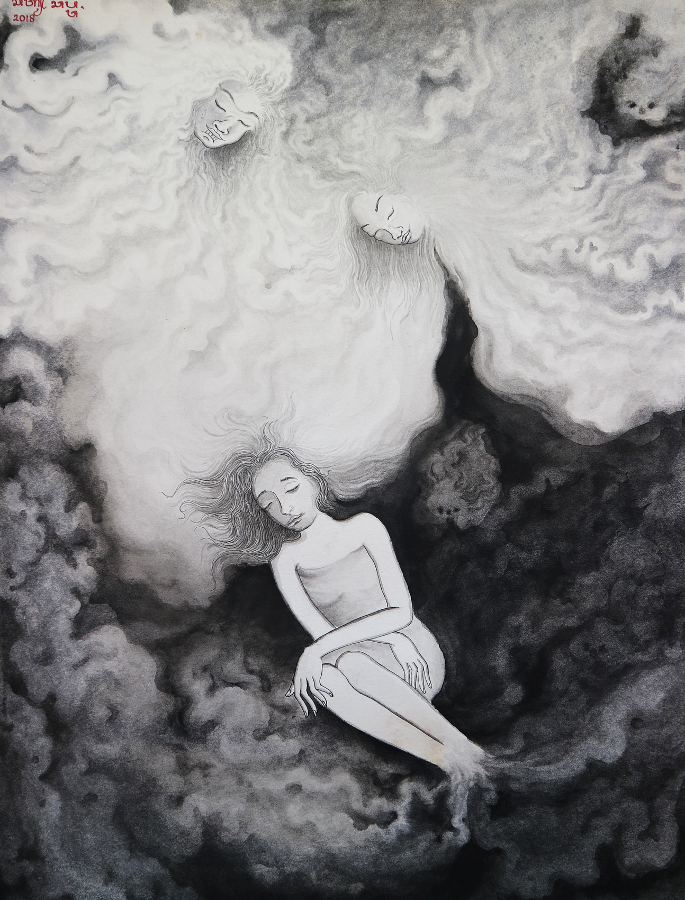If there has been an important behavioural notion that has been imported from India to Bali, it is the notion of purity, or rather the avoidance of impurity, nirmala – not impure.
To the Balinese, spiritual impurity is indeed a dreadful condition. First place, it is niskala (invisible) by nature, thus subjected to forces that are beyond control, and require complex cleansing ceremonies and offerings. Secondly, impurity affects the whole community. Events are cancelled, rule of avoidance have to be followed, and one’s normal life has to be modified. Impurity is thus a major disturbance, and everything is usually done to avoid what the Balinese alternatively call cuntaka, sebel, or leteh, meaning a condition of “invisible impurity.”
There is a whole range of impure (sebel) conditions. It can ensue from a person’s wrongdoing such as extra-marital relationships (mitra ngalang), incest (gamia gamana), sexual intercourse between a human being and an animal (salah timpal) and unlawful pregnancy. All are examples of wrongdoings that place a person in the position of sebel, whether the community knows it or not. As soon as the community is aware of the breach of purity, it intervenes so that the relevant cleansing ceremony takes place.

A person can also become impure (cuntaka) due to birth, menstruation or miscarriage. Of course, in this last-mentioned category of cuntaka, the person involved is a woman and is certainly not to blame, for she has done nothing wrong. She is “conditioned” by her own nature. It is not herself that causes impurity, but the excretions – the impure elements coming from her body, especially blood, but not exclusively. For example, if women wear a band around the head, it is to prevent their hair from falling to the ground. Similarly, like hair, nails may not fall to the ground.
Yet, in any case, both groups of cuntaka mentioned above bring about the same treatment: the person concerned is not allowed to enter sacred places and to participate in any religious ceremonies. Among the places the impure person is banned from is the kitchen, which houses the god Brahma in the fire, and the god Wisnu in the water just. Under such conditions, it is the husband that has to do the cooking! After one has suffered from impurity, before one enters again into a temple or sacred place–like the kitchen, one has to undergo a melukat ceremony – a purification ceremony that will cleanse all impurity.
The Balinese are also subjected to powers that are beyond their capacity to control. Death is an example. They believe that the death of others – especially relatives – affect their spiritual cleanliness, only if they come into contact with the dead, either by direct touch or by active participation in the ceremonies held in connection with the deceased. Before being purified by tirtha (holy water), they regard themselves as being cuntaka.
Are all members of the community subject to the cuntaka condition? No! As is always the case, there are exceptions for every stipulation. Sang Sulinggih (the high priest), Sang Angawa Rat (persons with extraordinary spiritual power), Pemangku Kahyangan Jagat (priests in charge of island-wide temple communities) and Pamangku Kahyangan Tiga (temple priests in charge of village temples) are all people who, on the account of their function enjoy the privilege of being normally from their impure condition.
Here again, however, there are differences and categories. High priest do not normally become cuntaka, because they are deemed to embody what the Balinese call ‘Surya’ or ‘Siwa’, the principle of the godly and they are therefore able to purify themselves…. Regarding the pemangku, it depends on their type. The pemangku of the village temples, Mangku Dalem, Mangku Desa, Mangku Puseh are not subjected to normal cuntaka, except if a member of their family passes away. After the cremation is over, though, they have to undergo a nyepuh pewintenan, a cleansing of their priestly function.
There are also ritual operatives who are impervious to ritual impurity, in particular in the case of a death. This is usually on account of their function. Such is the case for example of those assigned to preparation of offerings (Sang Ajamana) and the person in charge of the finishing touches of the death ceremony (Sang Muput).
But do not over think that leteh only concerns inanimate objects and animals. Human beings could be leteh too. Illegitimate children before being purified ) Wong bebinjat sane durung sinangaskara), de facto couples (wong mamitra ngalang ), lunatics (jadma buduh) are categorised as impure people (jadma leteh).
In the last instance, sebel also refers to deeds or actions. Uttering obscenities (wak purusya), fighting (mawiyadi), urinating (mawarih) defecating (makoratan) and engaging in sexual intercourse (sanggama) are strictly condemned as sebel actions, when exercised in a temple.
Luckily or not, the perception of sebel is changing, in particular for women, helped by the the arrival of consumer goods. Women not only use a toothbrush and tooth paste for their upper orifice, they now use hygienic tampons for one of their lower ones. It is certainly better than the ordinary tapih piece of cloth that did not always prevent blood from falling to the ground.
Is it because the blood does not fall on the ground as often as it did in the happy days of ordinary tradition, but it is now a fact that a number of modern Balinese, and non-Balinese alike take liberties by the preventative measures above. Not only are husbands reluctant to cook in the kitchen when their wives have their periods, allowing her to cook with blood present next to the kitchen fire and Wisnu at the tap water, but they insist that their rights of ’modern’ secularised husbands be respected in the middle of the night, or the early morning. As for the tourists who visit Balinese temples, who is going to check whether they respect the interdiction during their period.
No surprise then, if the reality of the hidden niskala forces reminds us of its presence: the grumbling of the mountain, the unexplained illnesses and the strange warnings of the hoary priests in trance. Gumi uba wayah. The world is getting old. Of course. Because it is impure.









